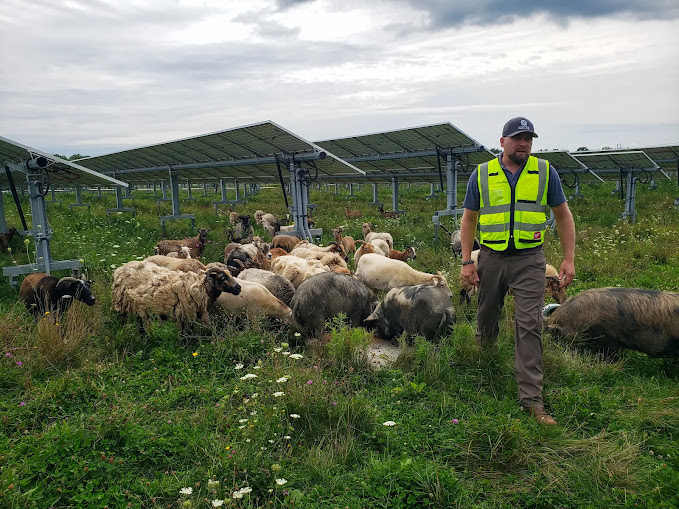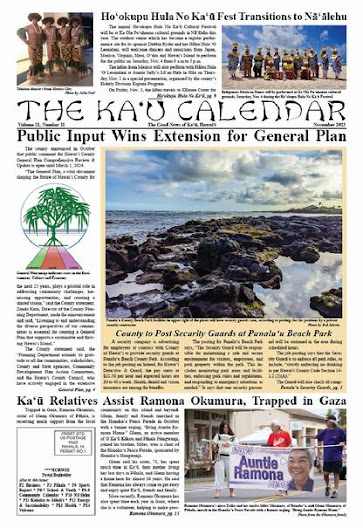 |
| Nexamp's website suggests pasturing pigs and other animals between solar panels. Nexamp held a community meeting in Nāʻālehu on Monday and plans a 20-acre solar farm. Another community meeting will be planned for early 2024. Photo from Nexamp.com |
 |
| Nexamp proposes to use some 20 acres on a 180 parcel near Wai‘ōhinu in ahupua‘a of Kahilipali. Map from Nexamp |
After the Nexamp man referred to Maui with its wildfire and managing land here to prevent a wildfire, a man who identified his own Wai‘ōhinu family as Hawaiian said, "We are talking about Kaʻū, not Maui," and that people care very specifically about what happens to the land here.
A community member said, "This land is precious" and that the community wants to make sure that the project is good. She suggested inviting community members to the land so they could better understand what the construction would look like on the land. She said to clear a path and show people.
The Nexamp man said that he would have to get permission from the owner of the land who is planning to lease to Nexamp.
Nexamp provides solar to those who sign up for it to save on electric bills. It is designed for those would would not install their own solar panels. Roof-top solar generates tax credits and dumps or reduces the electric bill while raising the value of the property, but requires a cash investment or a loan to pay for it. Nexamp solar has no upfront costs, no long-term contracts and brings instant savings with no work required of the property owner. The savings with Nexamp have been calculated at around ten to 15 percent.
Nexamp representatives said they will be back for another community meeting in the first quarter of next year, in February or March. and that anyone who wants to be notified by email can send their email address. They also said they are available to answer questions and listen to community concerns. See www.nexamp.com.
Nexamp is based in Boston and is led by CEO Zaid Ashai, who earned an MBA from Harvard University and Masters of Public Administration from Kennedy School of Government. He is a General Partner at Point Judith Capital and worked at Good Energies, a global Clean Tech venture capital firm; HarbourVest Partners, a global private equity firm; and as a banking analyst in Credit Suisse's Technology Group. See more on Nexamp at www.nexamp.com.
To read comments, add your own, and like this story, see facebook.com/kaucalendar. See latest print edition at kaucalendar.com, in the mail and on stands.
NEXAMP SUGGESTS PASTURING PIGS AT SOLAR FARMS. Calling the approach Agrivoltaics: A Sustainable Synergy, Nexamp, the company planning a solar farm in ahupua‘a of Kahilipali near Waiohinu, suggests that raising free-ranging pigs between the solar panels could become a successful venture to feed people, provide electricity and take care of the land.
 |
| Pasturing pigs to manage land at solar farms is suggested by Nexamp, which is planning a solar project near Waiohinu. Photo from Nexamp |
"At the heart of Nexamp's agrivoltaic approach lies the introduction of pasture pigs. These animals are not your ordinary farm animals; they play a crucial role in maintaining the solar farm's functionality and ecological balance." Nexamp contends that pigs are good in numerous ways.
Natural Land Management: Pasture pigs are expert foragers. They graze on the vegetation beneath and around the solar panels, keeping the vegetation in check and preventing it from shading the panels. This natural form of land management reduces the need for heavy machinery and herbicides, making the solar farm more eco-friendly.
Fertilization: As they graze and root around, pasture pigs also contribute to fertilizing the soil. Their natural behaviors improve soil health, creating a more conducive environment for the growth of cover crops and other vegetation.
Reducing Maintenance Costs: By enlisting the help of these natural grazers, Nexamp significantly reduces the maintenance costs associated with solar farms. This not only benefits the environment but also makes solar energy more economically viable.
.jpg) |
| Team Rumblah with Kalani Vierra and crew. |
.jpg) |
| Team Watusi with Cy Lopez, Jr. and crew. |
For Heaviest Overall, with weigh-in at 151 lbs., winner is Team JB Cowboys with Jere Benevides and crew.
For Heaviest Boar, with weigh-in at 128 lbs., winner is Team Mauka Ready with Tyrell Mason and crew.
For Heaviest Sow, with weigh in at 117.8 lbs., winner is Team Quincy, with Quincy Kaawa and crew.
The other teams that weighed in were Team Sub D Boyz, with Chisum and Cameron Silva, Jaron Garcia and crew; Team No Fck Around with Kawika Santiago and Trieso Pascubillio; Team Rumblah with Kalana Vierra and Crew; and Team Watsui with Cy Lopez, Jr. and crew.
Other entries were Team Mauka Mafia with Kalei Fernandez and crew; Team Fatson, with Kekoa Ching and crew; Team Sub D BoyZ with Wrangler Silva and Davedon Cabreros; Team Give 'Em Hell with Clinton Navas-Torres and crew; Team Creature, with Derek Nakagawa and crew; Team M.V.B. with Calvin Llanes and crew; Team Go Look See with Chance and Bubu Emmsley and crew; Team Rubbah with Kaikea Kaiao and Kaielana; Team Raunchy with Jeremiah Dacalio and crew; Team Click Clack Boom with Mana Joe Jamal and Darren; Team Malosi with Sage Santiago and crew; Team Try EM with Kama Medeiros and RJ Kahele; Team Big Mike; and Team Bloody Backs with Travis Pama and crew.
The organizers said they thank all hunters and sponsors, including Pono's Used Cars, Pearls, Tokunaga, Natin2Krazy, Rusty Boar, Pork Fat (Bulla Kaleo) Papa Bull and Mama Donna, Uncle Ots, Aunty Kaeza and Kylie Rae, Darren Kai and family, and Uncle Jojo and family. They also thank Glenn Okumura and Wayne Kawachi for Pāhala Hongwanji for the weigh-in venue.
.jpg) |
| With the big trophy and prizes, above, JB Cowboys with Jere Benevides and crew hunted down Heaviest Overall, weighing in at 151 lbs., below. Photos from the pig hunt tournament.  |
.jpg) |
| Heaviest Sow weighed in at 117.8 lbs, hunted down by Team Quincy with Quincy Kaawa and crew. |
"Our local kids and their families are our number one priority," said Mayor Mitch Roth. "Signing Bill 72 into law solidifies our County's commitment to our people and ensures they will legally have preference in receiving housing under our County's Affordable Housing Policy. We would like to thank the visionary efforts of Council Chair Kimball and Councilman Inaba for seeing this much-needed piece of legislation through from draft to signing. Our County is better off today because of collective leadership grounded in the prosperity of future generations."
The measure was spearheaded by Council Chair Heather Kimball and Vice Chair Holeka Goro Inaba.
"The passage of this ordinance signifies the County's commitment to addressing the affordable housing crisis and ensuring that its residents have the opportunity to secure suitable housing. These amendments seek to create a more inclusive and flexible framework to meet the diverse needs of Hawai'i County residents seeking affordable housing options," said Kimball.
"I am excited to see Bill 72 come to life. The production of affordable housing is a necessity; however, we need to ensure that our own residents, workers, and keiki are being prioritized for these units. Bill 72
.jpg) |
| Team SUB D BOYZ with Chisum and Cameron Silva, Jaron Garcia and crew. |
does this and gives hope to the many individuals and families who apply for housing where applications are received and evaluated by the County," added Inaba.
First, it revises the definition of an "eligible buyer" to mean a person who meets eligibility requirements, including income limitations, as established by the chapter or by rule. This change effectively broadens the eligibility criteria, potentially allowing more residents to qualify for affordable housing.
Second, the bill adds language defining three types of qualified applicants for affordable housing: a "qualified resident," a "qualified returning student," and a "qualified worker."
These new definitions aim to provide a more comprehensive framework for determining eligibility based on residency and employment within the County.
The third amendment to Chapter 11 establishes preference criteria for affordable housing applicants. It outlines specific applicant preferences based on the three new definitions listed above. The housing administrator is given the authority to set the order of preferences and the selection process for applicants for any given County-managed affordable housing
project.
"When we are investing and using public funds on affordable housing projects, we want to make sure that we can give Hawaiʻi residents preference for housing when possible. This law creates the mechanism to do just that for projects overseen by the Office of Housing and Community Development," said Housing Administrator Susan Kunz. "The Office thanks the County Council for its work to create this law benefitting Hawaiʻi Island residents."
.jpg) |
Mayor Mitch Roth signs Bill 72 on Monday, accompanied by Council Chair Heather Kimball (left) and Housing Administrator Susan Kunz (right). Photo from the Mayor's Office |

.jpg)


.JPG)




.png)





%20copy.jpg)